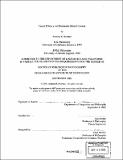Causal efficacy and externalist mental content
Author(s)
Newman, Anthony E. (Anthony Edison), 1970-
DownloadFull printable version (9.868Mb)
Other Contributors
Massachusetts Institute of Technology. Dept. of Linguistics and Philosophy.
Advisor
Alex Byrne.
Terms of use
Metadata
Show full item recordAbstract
Internalism about mental content is the view that microphysical duplicates must be mental duplicates as well. This dissertation develops and defends the idea that only a strong version of internalism is compatible with our commonsense commitment to mental causation. Chapter one defends a novel necessary condition on a property's being causally efficacious - viz., that any property F that is efficacious with respect to event E cannot be instantiated in virtue of any property G that is itself ceteris paribus sufficient for E -- and shows that that necessary condition vindicates the idea that externalism is incompatiblewith our commonsense commitment to mental causation. The internalist's core intuition is that only intrinsic properties can be causally efficacious. Chapter two defends that intuition from the common externalist response that extrinsic properties abound. A popular "Middle Way" between externalism and internalism holds that although ordinary, "folk-psychological" contents of prepositional attitudes are extrinsic, there exists some other non-folk-psychological kind of content that is intrinsic. Chapter three argues that Jerry Fodor's influential argument for the Middle Way is incoherent. Chapter four identifies a weak but popular grade of internalism, endorsed by John Searle among others, and argues that it is untenable. (cont.) The preceding defense of internalism can be believed only if there is something wrong with the canonical arguments for externalism developed by Hillary Putnam, Tyler Burge, and Saul Kripke. My postscript says what I think is wrong with the canonical externalist arguments: they assume the nonexistence of propositions that are truth-evaluable only relative to particular persons, places, or times; while I argue that our commonsense commitment to mental causation requires at least some such "indexical propositions".
Description
Thesis (Ph. D.)--Massachusetts Institute of Technology, Dept. of Linguistics and Philosophy, 2002. Includes bibliographical references (leaves 150-155).
Date issued
2002Department
Massachusetts Institute of Technology. Department of Linguistics and PhilosophyPublisher
Massachusetts Institute of Technology
Keywords
Linguistics and Philosophy.